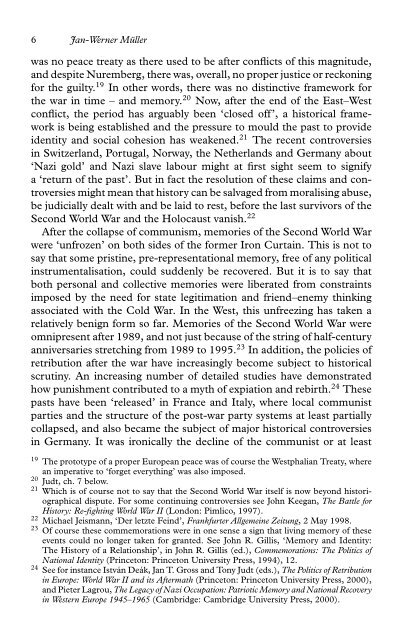Memory and Power in Post-War Europe: Studies in the Presence of ...
Memory and Power in Post-War Europe: Studies in the Presence of ...
Memory and Power in Post-War Europe: Studies in the Presence of ...
You also want an ePaper? Increase the reach of your titles
YUMPU automatically turns print PDFs into web optimized ePapers that Google loves.
6 Jan-Werner Müller<br />
was no peace treaty as <strong>the</strong>re used to be after conflicts <strong>of</strong> this magnitude,<br />
<strong>and</strong> despite Nuremberg, <strong>the</strong>re was, overall, no proper justice or reckon<strong>in</strong>g<br />
for <strong>the</strong> guilty. 19 In o<strong>the</strong>r words, <strong>the</strong>re was no dist<strong>in</strong>ctive framework for<br />
<strong>the</strong> war <strong>in</strong> time – <strong>and</strong> memory. 20 Now, after <strong>the</strong> end <strong>of</strong> <strong>the</strong> East–West<br />
conflict, <strong>the</strong> period has arguably been ‘closed <strong>of</strong>f’, a historical framework<br />
is be<strong>in</strong>g established <strong>and</strong> <strong>the</strong> pressure to mould <strong>the</strong> past to provide<br />
identity <strong>and</strong> social cohesion has weakened. 21 The recent controversies<br />
<strong>in</strong> Switzerl<strong>and</strong>, Portugal, Norway, <strong>the</strong> Ne<strong>the</strong>rl<strong>and</strong>s <strong>and</strong> Germany about<br />
‘Nazi gold’ <strong>and</strong> Nazi slave labour might at first sight seem to signify<br />
a ‘return <strong>of</strong> <strong>the</strong> past’. But <strong>in</strong> fact <strong>the</strong> resolution <strong>of</strong> <strong>the</strong>se claims <strong>and</strong> controversies<br />
might mean that history can be salvaged from moralis<strong>in</strong>g abuse,<br />
be judicially dealt with <strong>and</strong> be laid to rest, before <strong>the</strong> last survivors <strong>of</strong> <strong>the</strong><br />
Second World <strong>War</strong> <strong>and</strong> <strong>the</strong> Holocaust vanish. 22<br />
After <strong>the</strong> collapse <strong>of</strong> communism, memories <strong>of</strong> <strong>the</strong> Second World <strong>War</strong><br />
were ‘unfrozen’ on both sides <strong>of</strong> <strong>the</strong> former Iron Curta<strong>in</strong>. This is not to<br />
say that some prist<strong>in</strong>e, pre-representational memory, free <strong>of</strong> any political<br />
<strong>in</strong>strumentalisation, could suddenly be recovered. But it is to say that<br />
both personal <strong>and</strong> collective memories were liberated from constra<strong>in</strong>ts<br />
imposed by <strong>the</strong> need for state legitimation <strong>and</strong> friend–enemy th<strong>in</strong>k<strong>in</strong>g<br />
associated with <strong>the</strong> Cold <strong>War</strong>. In <strong>the</strong> West, this unfreez<strong>in</strong>g has taken a<br />
relatively benign form so far. Memories <strong>of</strong> <strong>the</strong> Second World <strong>War</strong> were<br />
omnipresent after 1989, <strong>and</strong> not just because <strong>of</strong> <strong>the</strong> str<strong>in</strong>g <strong>of</strong> half-century<br />
anniversaries stretch<strong>in</strong>g from 1989 to 1995. 23 In addition, <strong>the</strong> policies <strong>of</strong><br />
retribution after <strong>the</strong> war have <strong>in</strong>creas<strong>in</strong>gly become subject to historical<br />
scrut<strong>in</strong>y. An <strong>in</strong>creas<strong>in</strong>g number <strong>of</strong> detailed studies have demonstrated<br />
how punishment contributed to a myth <strong>of</strong> expiation <strong>and</strong> rebirth. 24 These<br />
pasts have been ‘released’ <strong>in</strong> France <strong>and</strong> Italy, where local communist<br />
parties <strong>and</strong> <strong>the</strong> structure <strong>of</strong> <strong>the</strong> post-war party systems at least partially<br />
collapsed, <strong>and</strong> also became <strong>the</strong> subject <strong>of</strong> major historical controversies<br />
<strong>in</strong> Germany. It was ironically <strong>the</strong> decl<strong>in</strong>e <strong>of</strong> <strong>the</strong> communist or at least<br />
19 The prototype <strong>of</strong> a proper <strong>Europe</strong>an peace was <strong>of</strong> course <strong>the</strong> Westphalian Treaty, where<br />
an imperative to ‘forget everyth<strong>in</strong>g’ was also imposed.<br />
20 Judt, ch. 7 below.<br />
21 Which is <strong>of</strong> course not to say that <strong>the</strong> Second World <strong>War</strong> itself is now beyond historiographical<br />
dispute. For some cont<strong>in</strong>u<strong>in</strong>g controversies see John Keegan, The Battle for<br />
History: Re-fight<strong>in</strong>g World <strong>War</strong> II (London: Pimlico, 1997).<br />
22 Michael Jeismann, ‘Der letzte Fe<strong>in</strong>d’, Frankfurter Allgeme<strong>in</strong>e Zeitung, 2 May 1998.<br />
23 Of course <strong>the</strong>se commemorations were <strong>in</strong> one sense a sign that liv<strong>in</strong>g memory <strong>of</strong> <strong>the</strong>se<br />
events could no longer taken for granted. See John R. Gillis, ‘<strong>Memory</strong> <strong>and</strong> Identity:<br />
The History <strong>of</strong> a Relationship’, <strong>in</strong> John R. Gillis (ed.), Commemorations: The Politics <strong>of</strong><br />
National Identity (Pr<strong>in</strong>ceton: Pr<strong>in</strong>ceton University Press, 1994), 12.<br />
24 See for <strong>in</strong>stance István Deák, Jan T. Gross <strong>and</strong> Tony Judt (eds.), The Politics <strong>of</strong> Retribution<br />
<strong>in</strong> <strong>Europe</strong>: World <strong>War</strong> II <strong>and</strong> its Aftermath (Pr<strong>in</strong>ceton: Pr<strong>in</strong>ceton University Press, 2000),<br />
<strong>and</strong> Pieter Lagrou, The Legacy <strong>of</strong> Nazi Occupation: Patriotic <strong>Memory</strong> <strong>and</strong> National Recovery<br />
<strong>in</strong> Western <strong>Europe</strong> 1945–1965 (Cambridge: Cambridge University Press, 2000).
















